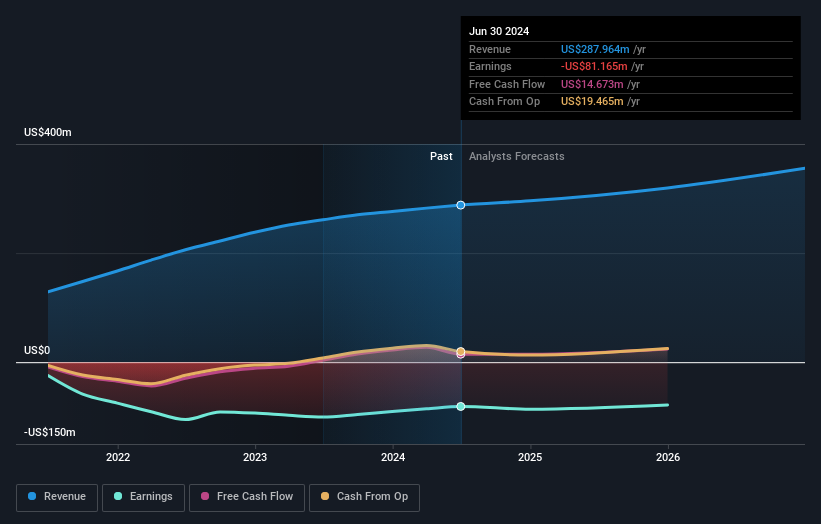- United States
- /
- Software
- /
- NasdaqCM:AMPL
Analysts Have Been Trimming Their Amplitude, Inc. (NASDAQ:AMPL) Price Target After Its Latest Report
Amplitude, Inc. (NASDAQ:AMPL) came out with its second-quarter results last week, and we wanted to see how the business is performing and what industry forecasters think of the company following this report. The results look positive overall; while revenues of US$73m were in line with analyst predictions, statutory losses were 9.2% smaller than expected, with Amplitude losing US$0.19 per share. Earnings are an important time for investors, as they can track a company's performance, look at what the analysts are forecasting for next year, and see if there's been a change in sentiment towards the company. So we gathered the latest post-earnings forecasts to see what estimates suggest is in store for next year.
View our latest analysis for Amplitude

Taking into account the latest results, the current consensus from Amplitude's ten analysts is for revenues of US$295.7m in 2024. This would reflect a reasonable 2.7% increase on its revenue over the past 12 months. Losses are expected to hold steady at around US$0.67. Yet prior to the latest earnings, the analysts had been forecasting revenues of US$294.0m and losses of US$0.68 per share in 2024.
As a result, it's unexpected to see that the consensus price target fell 7.1% to US$9.75, with the analysts seemingly becoming more concerned about ongoing losses, despite making no major changes to their forecasts. There's another way to think about price targets though, and that's to look at the range of price targets put forward by analysts, because a wide range of estimates could suggest a diverse view on possible outcomes for the business. Currently, the most bullish analyst values Amplitude at US$14.00 per share, while the most bearish prices it at US$8.00. This is a fairly broad spread of estimates, suggesting that analysts are forecasting a wide range of possible outcomes for the business.
Of course, another way to look at these forecasts is to place them into context against the industry itself. It's pretty clear that there is an expectation that Amplitude's revenue growth will slow down substantially, with revenues to the end of 2024 expected to display 5.5% growth on an annualised basis. This is compared to a historical growth rate of 24% over the past three years. Compare this against other companies (with analyst forecasts) in the industry, which are in aggregate expected to see revenue growth of 12% annually. Factoring in the forecast slowdown in growth, it seems obvious that Amplitude is also expected to grow slower than other industry participants.
The Bottom Line
The most obvious conclusion is that the analysts made no changes to their forecasts for a loss next year. Fortunately, the analysts also reconfirmed their revenue estimates, suggesting that it's tracking in line with expectations. Although our data does suggest that Amplitude's revenue is expected to perform worse than the wider industry. The consensus price target fell measurably, with the analysts seemingly not reassured by the latest results, leading to a lower estimate of Amplitude's future valuation.
With that in mind, we wouldn't be too quick to come to a conclusion on Amplitude. Long-term earnings power is much more important than next year's profits. We have estimates - from multiple Amplitude analysts - going out to 2026, and you can see them free on our platform here.
You should always think about risks though. Case in point, we've spotted 2 warning signs for Amplitude you should be aware of.
New: Manage All Your Stock Portfolios in One Place
We've created the ultimate portfolio companion for stock investors, and it's free.
• Connect an unlimited number of Portfolios and see your total in one currency
• Be alerted to new Warning Signs or Risks via email or mobile
• Track the Fair Value of your stocks
Have feedback on this article? Concerned about the content? Get in touch with us directly. Alternatively, email editorial-team (at) simplywallst.com.
This article by Simply Wall St is general in nature. We provide commentary based on historical data and analyst forecasts only using an unbiased methodology and our articles are not intended to be financial advice. It does not constitute a recommendation to buy or sell any stock, and does not take account of your objectives, or your financial situation. We aim to bring you long-term focused analysis driven by fundamental data. Note that our analysis may not factor in the latest price-sensitive company announcements or qualitative material. Simply Wall St has no position in any stocks mentioned.
About NasdaqCM:AMPL
Amplitude
Provides a digital analytics platform that analyzes customer behavior in the United States and internationally.
Flawless balance sheet and undervalued.
Similar Companies
Market Insights
Community Narratives



